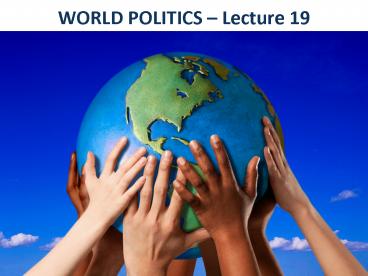WORLD POLITICS Lecture 19 - PowerPoint PPT Presentation
1 / 16
Title:
WORLD POLITICS Lecture 19
Description:
... important change, the overall political purposes of the Japanese economy remain ... and political goals, the central role of the Japanese state in the economy ... – PowerPoint PPT presentation
Number of Views:48
Avg rating:3.0/5.0
Title: WORLD POLITICS Lecture 19
1
WORLD POLITICS Lecture 19
2
GLOBALIZATION AND ITS DISCONTENTS
3
GLOBALIZATION
- Globalization refers to the increasing linkage of
national economies through trade, financial
flows, and foreign direct investment (FDI) by
multinational firms.
4
GLOBALIZATION AND ITS DISCONTENTS
- While economic globalization is indeed very
important, the world is not nearly as integrated. - Globalization rests on a political foundation
that could disintegrate if the major powers fail
to strengthen their economic and political ties.
5
Uneven Globalization
- Integration of the world economy has been highly
uneven, restricted to particular economic sectors - Although the technology leading to increased
globalization may be irreversible, the national
policies responsible for the process of
globalization have been reversed in the past and
could be again in the future. - The economic impact of globalization has been
largely confined to the United States, Western
Europe, Japan, and to the emerging markets of
East Asia.
6
Free Market Argument
- Globalization is leading to an era of
unprecedented prosperity. - As more and more nations participate in the
global economy, financial and technology flows
from developed to less developed countries lead
to equalization of wealth and development around
the world.
7
International Distribution of Wealth and Power
- Proponents argue that globalization will
eventually achieve greater equality and
convergence of performance among national
economies. - Globalization will increase worldwide acceptance
of individualism and political democracy.
8
Example of International Distribution of Wealth
- As the productivity of low-wage workers in
developing countries increases, their wages will
also rise, and thus their alleged threat to
high-wage workers in the developed countries will
be reduced. - For example, as Korea has industrialized, the
wages its workers have risen considerably and
have approached Western levels.
9
Populist (Nationalist) Argument
- Populists blame globalization for most of the
social, economic, and political ills afflicting
the United States and other industrialized
societies - There is growing economic inequality and high
levels of unemployment within the industrialized
economies, illegal migration, increasing crime. - Globalization threatens the security and economic
well-being of the United States and Europe.
10
Example of Weak International Distribution of
Wealth
- The largest segment of the world's population has
scarcely been touched by economic globalization. - Africa and other impoverished regions are more
threatened by marginalization and neglect than by
globalization and exploitation. - However, if they isolate themselves from the
international economy, they risk falling farther
behind and dropping in the international
hierarchy.
11
Globalization as a source of political troubles
- German investment in the transitional economies
of Eastern Europe, American investment in Latin
America, Japanese investment in Pacific Asia and
Multinational corporations in Nigeria are
triggering extremist attacks on foreign firms and
investors.
12
Convergence of Economic Systems
- Proponents of a market-dominated world economy
foresee all nations converging toward a new world
order based on liberal values (free markets,
individualism, and freedom), spreading global
prosperity, and world peace. - Globalization is inevitable and cannot be
reversed.
13
The End of National Sovereignty
- Loss of National Autonomy
- Both critics and proponents of globalization
argue that the increasing integration of national
societies has led to a decrease in the economic,
political, and cultural autonomy of
nation-states, or the end of their national
sovereignty. - Various individuals and groups argue that
globalization entails the end of economic
independence, erosion of political democracy, and
a debilitating process of cultural homogenization - They even charge that economic integration of
national societies means that domestic groups,
and even whole societies, are losing control over
their own destinies to powerful outside economic
and technological forces.
14
Reservations
- National differences continue to be fundamental
and of determining importance in the functioning
of capitalist or market economies. - Very little convergence has taken place at the
level of national institutions. National
institutions tend to be sticky or, in the
language of economics, inelastic. - The domestic effects of globalization are largely
determined by states themselves.
15
Reservations (Cont.)Example Japan
- The fundamental aspects of Japanese societythe
subordination of the individual to the group, an
intense, tribal nationalism, and a fierce desire
to maintain national independence and to "catch
up" with the West-remain. - It is certainly true that Japan in recent years
has experienced a number of noteworthy economic
and institutional changes as the overwhelming
role of the state in the economy has moderated. - Despite this important change, the overall
political purposes of the Japanese economy remain
those of preservation of domestic social harmony
and strengthening of national independence. - In pursuit of these fundamental social and
political goals, the central role of the Japanese
state in the economy is very likely to continue,
and Japan will strongly resist American-style
"marketization" of its economy.
16
Clear Application of Globalization
- The one important economic area to which the term
globalization clearly does apply, however, is
international finance, and the East Asian
economic crisis and the global economic turmoil
of the late 1990s gave considerable credence to
the charge that globalization has significantly
increased international economic instability.































